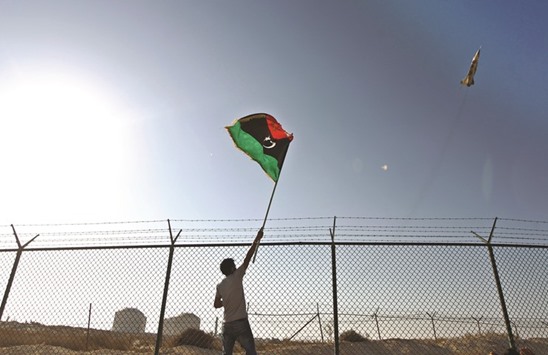Amid the most enduring global oil glut in decades, two Opec crude producers whose supplies have been crushed by domestic conflicts are preparing to add hundreds of thousands of barrels to world markets within weeks.
Libya’s state oil company on Wednesday lifted curbs on crude sales from the ports of Ras Lanuf, Es Sider and Zueitina, potentially unlocking 300,000 bpd of supply. In Nigeria, Exxon Mobil Corp was said to be ready to resume shipments of Qua Iboe crude, the country’s biggest export grade, which averaged about 340,000 bpd in shipments last year, according to Bloomberg estimates. On top of that, a second Nigerian grade operated by Royal Dutch Shell is scheduled to restart about 200,000 barrels a day of flow within days.
While there are reasons to be cautious about whether the barrels will actually flow as anticipated, a resumption of those supplies – more than 800,000 bpd in all – could more than triple the global surplus that has kept prices at less than half their levels in 2014. It would also come just as members of the Organisation of Petroleum Exporting Countries and Russia are set to meet in Algiers later this month to discuss a possible output freeze to steady world oil markets.
“If you have some restart of Nigeria and some restart of Libya, then the rebalancing gets pushed even further out,” Olivier Jakob, managing director at Petromatrix in Zug, Switzerland, said by phone. “It complicates matters a lot before the meeting in Algeria.”
With a few exceptions, crude in New York and London has been stuck below $50 a barrel for months. The current global oil oversupply is about 370,000 bpd, according to data from the Paris-based International Energy Agency.
The resumption of shipments from the three Libyan ports would allow Libya to double crude output to 600,000 bpd within four weeks, National Oil Corp Chairman Mustafa Sanalla said Tuesday in a statement on the company’s website. The exports are possible after a substantial improvement in the security situation there, he said on Wednesday in a separate statement. The Tripoli-based NOC lifted a measure called force majeure, which gives the company the right not to meet supply commitments.
Libya has made at least half a dozen failed pledges to restart shipments. What may be different this time is that the NOC has struck a deal with Khalifa Haftar, commander of forces who took control of Es Sider and Ras Lanuf. He also has control of the oil fields and pipelines that feed them.
Meanwhile Exxon has filled storage facilities at its Qua Iboe export terminal in Nigeria and is awaiting government clearance to resume shipments, a person familiar with the matter said on Wednesday. Exxon declined to provide a timeline for a restart and said that a force majeure, in place since July, still stands.
In Nigeria, militant groups have repeatedly attacked oil infrastructure this year, making any resumption of flow reliant on pipeline and export terminals being secure from further incidents. Qua Iboe has been under force majeure since a “third- party impact” on a pipeline in July, according to Exxon.

A man waves a Libyan flag as fighter jet flies by at the Zueitina oil terminal on Wednesday. Libya’s state oil company on Wednesday lifted curbs on crude sales from the ports of Ras Lanuf, Es Sider and Zueitina, potentially unlocking 300,000 bpd of supply.
